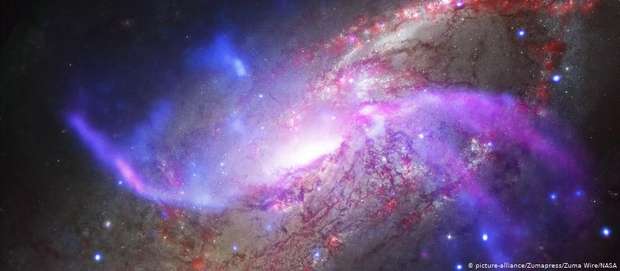Key features
- Immersion into a research laboratory from the start of your training
- Participation to an international promotion
- Access to PSL’s elective courses designed to improve your transdisciplinary skills and broaden your curriculum
- Mentorship throughout your training
- Opportunity to obtain a gap year during your master to work on a research project
- An offer of training in English
Research in astrophysics & education
Advanced research in astrophysics and engineering space science
aim at understanding the physical laws of the Universe, and the structure and evolution of its various components. Wide-ranging, it relies on outstanding scientific questions and ambitious projects, from the most theoretical to the most applied framework.
Modern astrophysics is characterized by sophisticated and innovative high-tech instruments, by observations pushing the limits of detectability ever further, by creative analytical and numerical calculations, and by datasets of ever-increasing volume requiring increasingly complex processing.
Thus, with AStroParis’ training through and for research irrigated by competitive projects of astrophysics in PSL, you will develop, in addition to advanced knowledge in astrophysics, various skills including : :
- Large amounts of scientific data analysis.
- Complex and interdisciplinary problems solving
- Design of complex instrumental tools
- High-Performance Digital Methodologies
in addition to the generic skills of research : scientific communication in English, project management.
Transdisciplinary and soft skills
Once in AStroParis, you will have access to PSL’s transdisciplinary offer thanks to its various institutions, especially you will be able to enrol in courses from graduate programs in Mathematics and Applications and Physics , and to university-wide trainings in core competencies, both introductory and advanced, designed to supplement their academic study.
Training through research
With lab immersion from the start of your training and (long) duration internship, you will be trained for an through research.
From the beginning of the M1 year, you will join a research team for two half-days a week, you will work in an international atmosphere with researches to be carried out in English.
You will find here examples of student works in laboratories.
For more information on Observatoire de Paris-PSL research
International
With worldwide PSL’s students promotion, possible Erasmus funding for abroad internship and abroad gap year, AStroParis offers you to participate in an international adventure.
Gap year
According to your professional project, your mentor will support you to validate your gap year between the M1 and the M2 year.
Mentorship
Each student is assigned a mentor who will help the student navigate graduate program by guiding them to achieve academic and professional goals and supporting their well-being and personal development. The mentor can guide students in course and track selection, help to prepare a possible gap year, provide coaching when preparing for oral exams, and counsel regarding postdoc placement or other career options. and assist in navigating difficult situations personal or professional when they arise.
Degrees
AStroParis allows you to prepare three disctinct degrees
- The M1 Master in Space Science and Technology (SUTS)
- The M2 Master in Space Science and Technology (SUTS) with five distinct tracks
- Physics or astrophysics doctorate degree
Master’s first year (M1)
The first year provides scientific and methodological courses. Students become familiar with the tools and concepts of astronomy and astrophysics while strengthening their fundamentals in physics and mathematics.
This first year is unique to PSL and takes place entirely in English.
For more information on Master 1.
Master’s second year (M2)
The second year includes 5 tracks :
- Astrophysics (Aφ)
- Dynamics of Gravitational Systems (DSG)
- International Research Track (IRT) - English track
- Planetary Science and Space Exploration (PES)
- Tools and Systems of Astronomy and Space (OSAE) - engineering track
For more information on Master 2 and on the International Research Track
Doctorate degree
Doctoral training offers you a first professional experience through the practice of astrophysics research and projects’implementation.
For more information on Doctorate degree.
Career opportunities
AStroParis’ aim is to train scientists ans scholars through astrophysical projects, and engineers in space science.
The skills developped in AStroParis will allow you to find opportunities in the academic world as scholar, in the industry as engineer or in consulting.
M1
M1 students continue in M2, M2 Master in Space Science and Technology (SUTS) or other (mainly in astrophysics, physics, mathematics or computer science).
M2
Students who do not pursue a with a doctorate degree are mainly employed in digital engineering, instrumental engineering, mainly in the space or high-tech sectors.
Doctorate degree
Doctors (one-third of whom are women) from PSL in astrophysics* took an average of 2.4 months to find a job. They work for nearly 3/4 in teaching, research or R&D.
A little less than one in two works in France and 16% outside Europe , 4/9th work for the public sector and 1/3 for a private company.
Finally, 83% are satisfied with their professional situation.
*Statistics based on responses from 21 of 27 graduates in 2018, as of December 1, 2019.

